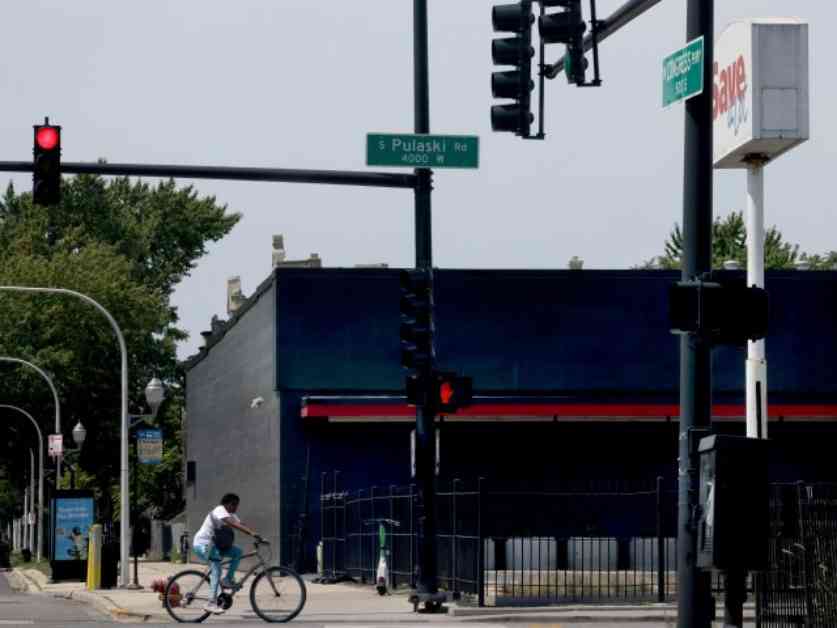Chicago’s Progress Towards City-Owned Grocery Store: Study Deems it Necessary and Feasible
Nearly a year after Mayor Brandon Johnson’s administration first proposed the idea of opening a city-owned grocery store to address food access issues in underserved communities, a recent feasibility study commissioned by the city has deemed the concept both necessary and feasible.
The study, conducted by an economic development consultancy called HR&A, suggests that a municipally owned grocery store could not only improve food access on Chicago’s South and West sides but also potentially turn a profit. The report recommends that the city explore various partnership models, such as working with a for-profit operator, a nonprofit organization, or a cooperative.
City policy chief S. Mayumi “Umi” Grigsby emphasized the importance of public options in increasing access, affordability, and services in areas where traditional grocery stores have been reluctant to operate. The study highlights the impact of decades of structural racism, segregation, and disinvestment on these neighborhoods, making it challenging to attract and retain grocery stores.
While Chicago would be the first major U.S. city to open a municipally owned grocery store, smaller municipalities have already ventured into this territory. The report acknowledges the historical challenges faced by previous mayors in addressing grocery store access on the South and West sides, despite efforts such as bringing in Whole Foods to Englewood and acquiring the site of a closed Aldi in West Garfield Park.
The feasibility study presents a range of funding and operational models for a city-owned grocery store, emphasizing the need for collaboration with experienced operators in the industry. By leveraging public resources and exploring innovative funding sources, the city aims to create sustainable grocery services in neighborhoods lacking access.
Exploring Different Partnership Models
One of the key recommendations of the feasibility study is to consider various partnership models for operating a city-owned grocery store. While for-profit operators bring industry expertise and experience, they may be hesitant to operate in economically challenged neighborhoods. Nonprofit organizations, on the other hand, are mission-driven and more likely to prioritize community service over profits. Co-ops offer a unique community-oriented approach but may face challenges in scalability.
The study suggests that the city could act as a landlord and provide rent or utility subsidies to an independent grocery operator, allowing for a collaborative approach to running a municipally owned store. By partnering with external operators, Chicago could benefit from industry knowledge while ensuring the store remains accessible and sustainable in the long run.
Addressing Financial Challenges
Operating a grocery store, especially in underserved areas, comes with significant financial challenges. The feasibility study estimates that a network of three stores could require an initial investment of $26.7 million but could ultimately yield cost savings through economies of scale. By exploring innovative funding sources such as tax incentives, grants, and public-private partnerships, the city aims to offset the upfront costs and create a financially viable model for city-owned grocery stores.
The report emphasizes the importance of long-term sustainability and profitability for municipally owned stores, highlighting the need for strategic financial planning and operational efficiency. By carefully considering different funding options and partnership models, Chicago hopes to establish a successful blueprint for addressing food access disparities in the city.
Community Impact and Public Health
Beyond the economic implications, the establishment of city-owned grocery stores has broader implications for community well-being and public health. Access to fresh, affordable food is essential for maintaining a healthy lifestyle and preventing chronic diseases, particularly in neighborhoods with limited grocery options.
By taking a proactive role in ensuring grocery access for all residents, Chicago aims to address disparities in health outcomes and promote overall community wellness. The feasibility study underscores the potential social benefits of city-owned grocery stores, including longer life expectancies and reduced rates of chronic disease in underserved communities.
In conclusion, the progress towards a city-owned grocery store in Chicago represents a significant step towards addressing food access disparities and promoting community health and well-being. By leveraging public resources, exploring innovative partnership models, and prioritizing long-term sustainability, the city aims to create a successful and profitable model for municipally owned grocery stores. As Chicago continues to refine its proposal and secure funding for this initiative, the potential impact on residents and neighborhoods in need of better food access remains promising.













